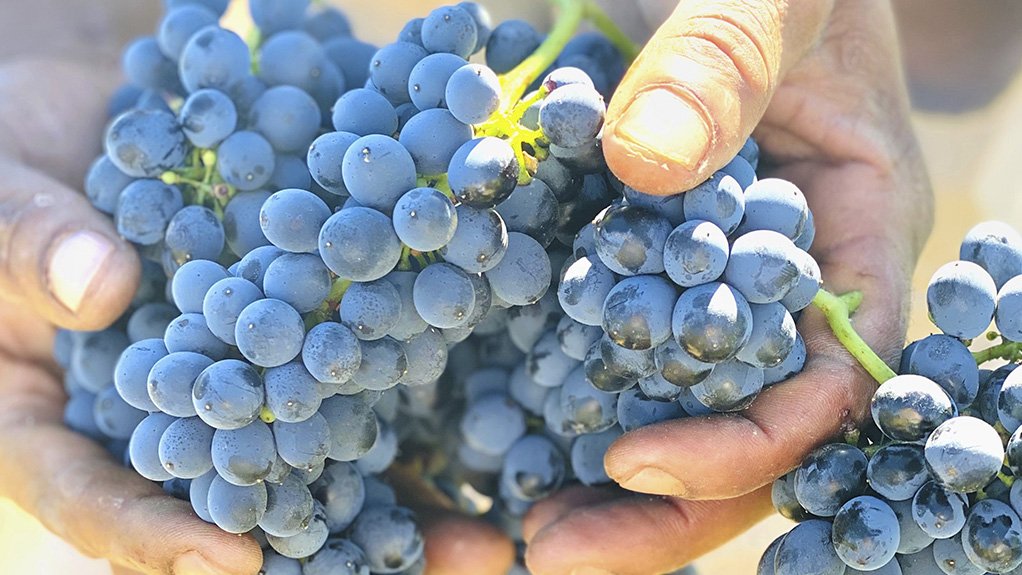Weather, loadshedding contribute to smaller wine grape crop
The 2023 wine grape harvest – from January to April – is expected to deliver a smaller crop than in 2022, viticulturists and producer cellars have indicated in the latest crop estimate.
Viticulturist organisation Vinpro says this year’s crop is estimated to be smaller at this early stage – perhaps the fourth smallest crop in 17 years.
“The season was characterised by mostly average cold units and fewer snow deposits on mountain peaks than in previous seasons.
“However, it was still enough to meet the vineyards' cold needs. Winter temperatures were mostly warmer in all the wine-producing regions and rainfall was significantly less except for the Northern Cape,” says Vinpro manager Conrad Schutte, who headed up the team responsible for compiling the crop estimate in collaboration with industry body the South African Wine Industry Information and Systems (Sawis).
According to Vinpro and Sawis, a warmer spring and dry soil conditions over the season has resulted in budding occurring earlier than usual. The evenness of budding was satisfactory, except for certain cultivars such as Chardonnay, where budding was uneven in some areas. Flowering also occurred earlier than normal in most vineyards and large differences occurred during the set of cultivars.
During the second week of December, the season changed notably when downpours brought welcome relief to the mostly hot and dry season. The rain eased pressure on irrigation scheduling since groundwater levels were below normal and growers cannot properly apply irrigation scheduling owing to loadshedding.
Along with the rain, there was sporadic hail damage in Paarl, Worcester and Robertson. Fungal disease pressure, particularly powdery and downy mildew, was exacerbated by the wet conditions and growers had to adjust spray programmes accordingly. Damage also occurred to roads and other infrastructure.
"The decrease in the estimate is mainly attributed to vineyard uprooting, especially the Northern Cape, Olifants River and Swartland.
“Furthermore, high disease pressure, especially the resultant powdery mildew infections in the Northern Cape, Olifants River, Swartland, Paarl, Stellenbosch, Cape South Coast and Cape Town, will negatively impact the crop size.
“Heat peaks in December and January also caused sunburn, especially in the Swartland, Worcester and Breedekloof. Across all regions, mainly the intensively irrigated areas, the lack of electricity needed for irrigation pumps to work will further negatively impact the crop size,” Schutte says.
Wine grape production in the Klein Karoo is, however, estimated to be higher than last year’s season thanks to young vineyards coming into production and promising water levels.
The next crop estimate by viticulturists and producer cellars will be released in the third week of February.
Article Enquiry
Email Article
Save Article
Feedback
To advertise email advertising@creamermedia.co.za or click here
Press Office
Announcements
What's On
Subscribe to improve your user experience...
Option 1 (equivalent of R125 a month):
Receive a weekly copy of Creamer Media's Engineering News & Mining Weekly magazine
(print copy for those in South Africa and e-magazine for those outside of South Africa)
Receive daily email newsletters
Access to full search results
Access archive of magazine back copies
Access to Projects in Progress
Access to ONE Research Report of your choice in PDF format
Option 2 (equivalent of R375 a month):
All benefits from Option 1
PLUS
Access to Creamer Media's Research Channel Africa for ALL Research Reports, in PDF format, on various industrial and mining sectors
including Electricity; Water; Energy Transition; Hydrogen; Roads, Rail and Ports; Coal; Gold; Platinum; Battery Metals; etc.
Already a subscriber?
Forgotten your password?
Receive weekly copy of Creamer Media's Engineering News & Mining Weekly magazine (print copy for those in South Africa and e-magazine for those outside of South Africa)
➕
Recieve daily email newsletters
➕
Access to full search results
➕
Access archive of magazine back copies
➕
Access to Projects in Progress
➕
Access to ONE Research Report of your choice in PDF format
RESEARCH CHANNEL AFRICA
R4500 (equivalent of R375 a month)
SUBSCRIBEAll benefits from Option 1
➕
Access to Creamer Media's Research Channel Africa for ALL Research Reports on various industrial and mining sectors, in PDF format, including on:
Electricity
➕
Water
➕
Energy Transition
➕
Hydrogen
➕
Roads, Rail and Ports
➕
Coal
➕
Gold
➕
Platinum
➕
Battery Metals
➕
etc.
Receive all benefits from Option 1 or Option 2 delivered to numerous people at your company
➕
Multiple User names and Passwords for simultaneous log-ins
➕
Intranet integration access to all in your organisation




















